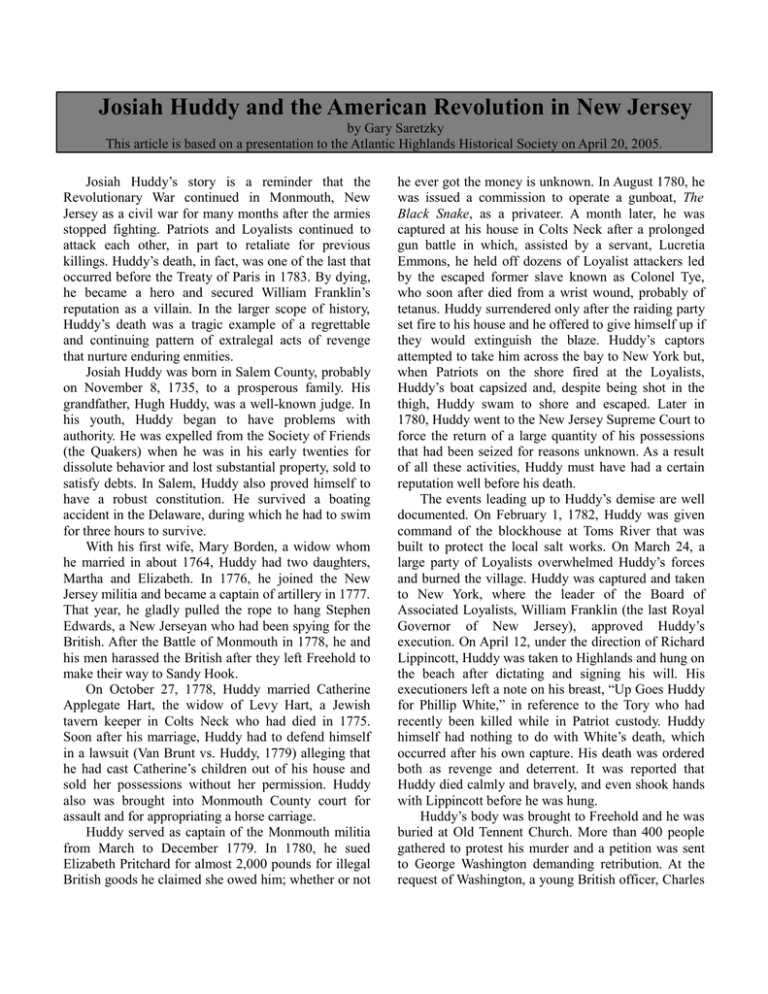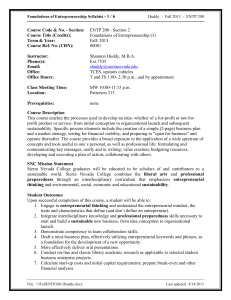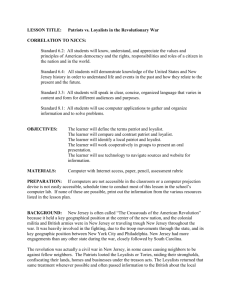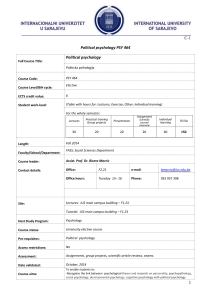Josiah Huddy and the American Revolution in New Jersey
advertisement

Josiah Huddy and the American Revolution in New Jersey by Gary Saretzky This article is based on a presentation to the Atlantic Highlands Historical Society on April 20, 2005. Josiah Huddy’s story is a reminder that the Revolutionary War continued in Monmouth, New Jersey as a civil war for many months after the armies stopped fighting. Patriots and Loyalists continued to attack each other, in part to retaliate for previous killings. Huddy’s death, in fact, was one of the last that occurred before the Treaty of Paris in 1783. By dying, he became a hero and secured William Franklin’s reputation as a villain. In the larger scope of history, Huddy’s death was a tragic example of a regrettable and continuing pattern of extralegal acts of revenge that nurture enduring enmities. Josiah Huddy was born in Salem County, probably on November 8, 1735, to a prosperous family. His grandfather, Hugh Huddy, was a well-known judge. In his youth, Huddy began to have problems with authority. He was expelled from the Society of Friends (the Quakers) when he was in his early twenties for dissolute behavior and lost substantial property, sold to satisfy debts. In Salem, Huddy also proved himself to have a robust constitution. He survived a boating accident in the Delaware, during which he had to swim for three hours to survive. With his first wife, Mary Borden, a widow whom he married in about 1764, Huddy had two daughters, Martha and Elizabeth. In 1776, he joined the New Jersey militia and became a captain of artillery in 1777. That year, he gladly pulled the rope to hang Stephen Edwards, a New Jerseyan who had been spying for the British. After the Battle of Monmouth in 1778, he and his men harassed the British after they left Freehold to make their way to Sandy Hook. On October 27, 1778, Huddy married Catherine Applegate Hart, the widow of Levy Hart, a Jewish tavern keeper in Colts Neck who had died in 1775. Soon after his marriage, Huddy had to defend himself in a lawsuit (Van Brunt vs. Huddy, 1779) alleging that he had cast Catherine’s children out of his house and sold her possessions without her permission. Huddy also was brought into Monmouth County court for assault and for appropriating a horse carriage. Huddy served as captain of the Monmouth militia from March to December 1779. In 1780, he sued Elizabeth Pritchard for almost 2,000 pounds for illegal British goods he claimed she owed him; whether or not he ever got the money is unknown. In August 1780, he was issued a commission to operate a gunboat, The Black Snake, as a privateer. A month later, he was captured at his house in Colts Neck after a prolonged gun battle in which, assisted by a servant, Lucretia Emmons, he held off dozens of Loyalist attackers led by the escaped former slave known as Colonel Tye, who soon after died from a wrist wound, probably of tetanus. Huddy surrendered only after the raiding party set fire to his house and he offered to give himself up if they would extinguish the blaze. Huddy’s captors attempted to take him across the bay to New York but, when Patriots on the shore fired at the Loyalists, Huddy’s boat capsized and, despite being shot in the thigh, Huddy swam to shore and escaped. Later in 1780, Huddy went to the New Jersey Supreme Court to force the return of a large quantity of his possessions that had been seized for reasons unknown. As a result of all these activities, Huddy must have had a certain reputation well before his death. The events leading up to Huddy’s demise are well documented. On February 1, 1782, Huddy was given command of the blockhouse at Toms River that was built to protect the local salt works. On March 24, a large party of Loyalists overwhelmed Huddy’s forces and burned the village. Huddy was captured and taken to New York, where the leader of the Board of Associated Loyalists, William Franklin (the last Royal Governor of New Jersey), approved Huddy’s execution. On April 12, under the direction of Richard Lippincott, Huddy was taken to Highlands and hung on the beach after dictating and signing his will. His executioners left a note on his breast, “Up Goes Huddy for Phillip White,” in reference to the Tory who had recently been killed while in Patriot custody. Huddy himself had nothing to do with White’s death, which occurred after his own capture. His death was ordered both as revenge and deterrent. It was reported that Huddy died calmly and bravely, and even shook hands with Lippincott before he was hung. Huddy’s body was brought to Freehold and he was buried at Old Tennent Church. More than 400 people gathered to protest his murder and a petition was sent to George Washington demanding retribution. At the request of Washington, a young British officer, Charles Asgill, was selected by lot to die unless Lippincott was turned over to the Patriots. Asgill’s youth and innocence made retaliation instantly controversial. But there were also legal problems: Washington had called for “an unconditional Prisoner” to be sacrificed, but Asgill had surrendered at Yorktown under the Articles of Capitulation, which explicitly forbade retaliation. Realizing the error, Washington sought to replace Asgill with another “unfortunate,” but in the confusion the plan fell through. The British delayed by holding their own courtmartial of Lippincott, who was found not guilty because he was following orders. The lengthy transcript of Lippincott’s trial, sent to Washington, is an excellent source of information about the Huddy case. Fortunately, Asgill was eventually released and returned to England. He was freed in November by an Act of Congress after his mother persuaded the French foreign minister to plead his case to Washington, who was grateful for a way to spare Asgill while saving face for himself and Congress. As for Lippincott, like many other Loyalists from Monmouth County, he emigrated to Canada, where the British gave him 3,000 acres as a reward for his services. In 1836, Huddy’s surviving daughter from his first marriage, Martha Piatt, wrote to Congress that the nation had never expressed its gratitude to Huddy and asked for money and land for herself and her late sister’s children. Although some published accounts state that she was successful, the bill was tabled and never acted upon. Although a few memorials were erected to him, including Huddy Park in Toms River in 1931, Huddy was largely forgotten until the Bicentennial Celebration in the 1970s renewed interest in Monmouth County’s fascinating history during the Revolutionary War. During the Bicentennial Era, several additional markers commemorating Huddy were erected in Monmouth County. Letter from Monmouth (New Jersey) to a Gentleman in this City Source: Pennsylvania Packet, October 3, 1780, p. 2, col. 2 & 3. Archibald S. Alexander Library, Rutgers University, XMCARD 1696 1777-1783 (part of Early American Newspapers series). Courtesy of Richard Walling. On Sunday morning, the 9th instant, 72 men, composed of New-Levies, Refugees and Negroes, under the command of Lieuts. Josiah Parker and William Hewlet, about an hour before day, attacked the house of Captain Joshua Huddy, of this county, in the following manner, viz. staving the windows to pieces, and ordering the damned rebels to turn out-This awoke Capt. Huddy, who, having two loaded guns at hand, made use of them in a proper manner through the windows; and by the assistance of a girl, who carried his cartridges and rammed, he interchanged his firing up and down stairs, in such a manner, that the assailants took it for granted a small scouting party must be there ; by this means he repulsed them, but on a consultation, they renewed the attack again, and fired the house, which induced him, on the entreaty of Mrs. Huddy and another woman, to capitulate on honourable terms, which were granted, and be delivered himself up a prisoner. On their entering the house, when they found none but himself had defended it, and their brave Negro Tye, (one of Lord Dunmore's crew) wounded, it was with the greatest difficulty he was prevented from being murdered. They broke the honor they had pledged, by not leaving Capt. Huddy and his family, a second change of cloaths; and, after near two hours spent in taking this one man, they made a shameful and silent retreat, loaded with disgrace. A short time after, six militia men pursued and came up with them, who renewed the attack, and killed their refugee Commander. After this they embarked in their boat, and passing the gut between Sandy Hook and the main, Ensign William Vincent, with 16 of the state regiment, Salem men, attacked them again. The first fire, Capt. Huddy, their prisoner was wounded, but is like to do well. This threw them into such confusion, that they overset their boats, four in number, and about twenty were killed and drowned. This gave Capt. Huddy an opportunity of attempting to make his escape by swimming, which he with much difficulty accomplished. We had but one man shot and wounded. This account is taken from Captain Huddy himself.






